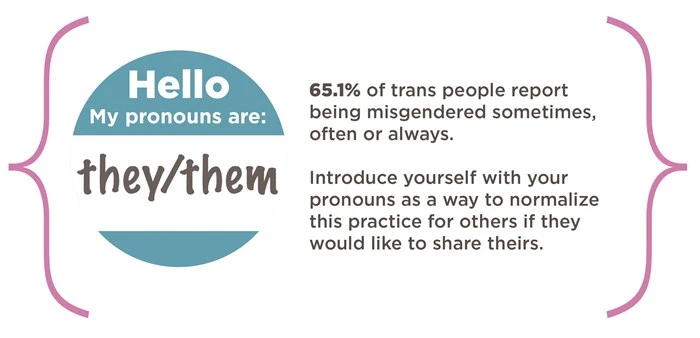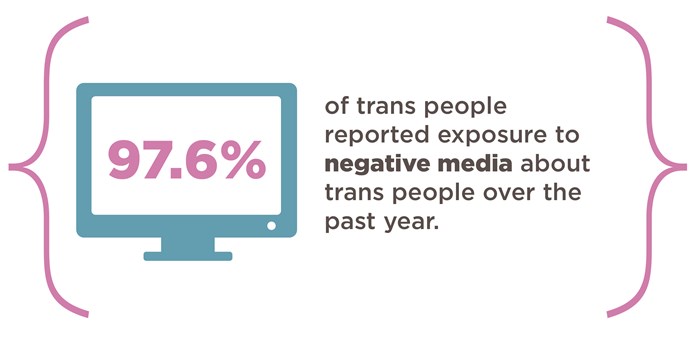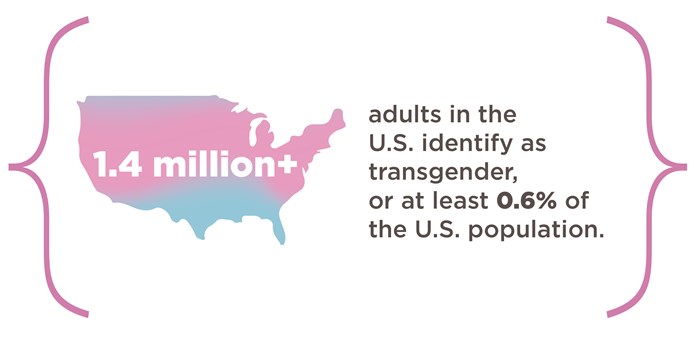Ask the expert: Recognizing and respecting trans identities
January 4, 2021 - Beth Brauer, Liz Schondelmayer
Netflix subscribers and comic and fantasy enthusiasts alike rejoiced when the streaming service announced its American superhero television series "The Umbrella Academy" (based on the comic book series of the same name) would be returning for season 3. Shortly thereafter, Elliot Page, who plays the character Vanya Hargreeves, came out publicly as transgender. Page is often recognized for their roles in "Juno," "Inception" and the "X-Men" series.
In the following interview, Michigan State's Jae Puckett, an assistant professor in the Department of Psychology's clinical science program, discusses how best to recognize and respect transgender identities. Puckett's research interests include working with the LGBTQ community and the experiences of transgender individuals. They are also the director of Trans-ilience, the transgender stress and resilience research team at MSU.
What is some basic etiquette (and terms) people ought to know when trying to understand/educate themselves (and others) about transgender and nonbinary issues?
First and foremost — respect trans people’s privacy and do the work of self-education without putting the burden on a trans person who has come out to you. Often, trans people are called on to be the educators of others and while some people may want to do this education, it often becomes unpaid emotional labor on the part of trans people for the benefit of cisgender individuals.
There are plenty of reputable sources where people can look to learn more about basic terms, key concepts and from people who have offered their personal experiences through memoirs, podcasts or videos. Taking the initiative to become more educated makes cisgender people better able to be supportive allies to trans individuals.
The second piece of advice I offer is to respect the name and pronouns that trans people go by. Misgendering happens when someone is called the wrong name, when others use the wrong pronouns or when people use gendered language that doesn’t align with a person’s identity (e.g., sir, ma’am, guys, ladies, etc.).
It is incredibly important — I would say even lifesaving — when people use the right name and pronouns for trans people. Names should never be determined based on what is on a person’s ID or legal documents. It is costly and time consuming to update this information and there are a variety of reasons that someone may not change their name legally. Decisions to respect this should never be based on whether someone has legally updated their information. Pronouns should never be assumed. You don’t know someone’s pronouns unless they’ve told you directly. If you make a mistake, which everyone does at some point, correct yourself, make a brief apology, move on and do better next time.
Mistakes that happen frequently are no longer mistakes – this becomes, to me, willfully ignoring and disregarding a trans person’s identity. When this happens, or when people intentionally misgender a trans person, they are harming this individual. Laverne Cox talks about misgendering as an act of violence and I think that is a great description of it. When intentional, these are attempts to cut directly to the core of someone’s sense of self and take that away from them. When unintentional, it still hurts in deep ways.
Research shows that misgendering happens often for trans people. One researcher found that 65.1% of their sample reported being misgendered sometimes, often or always. Research from the U.S. Trans Survey found that, of trans people who were out to their families, only roughly half had family who used the correct name and pronouns for them. In research from my lab, about 70% of our sample indicated that they had to repeatedly explain their gender or correct the pronouns people used for them. Given how commonplace misgendering is, it is important for cisgender people to understand that these aren’t one off experiences — this happens repeatedly even within the course of a single day, and there is a cumulative toll to this marginalization.

There is greater visibility for issues that impact trans lives now more than ever before. Why is that? Is transgender identity "new"?
There are likely a range of reasons for this, but I want to start by saying that trans people have always existed and that being trans is not a new concept or experience. There has certainly been an increase in information and knowledge about trans people over time. This is likely related to the internet and increased access to information outside of mainstream sources. There also has been a major rise in visibility in media and television, and more affirming portrayals of trans people in these outlets as well.
When you consider what you learn in school or who you learn about, topics related to the trans community and the contributions of trans people are often left out. As such, many people never get to hear about the major contributions from trans people or learn the basics of trans people’s lives. I believe that this results in less awareness overall about trans people that then has to be addressed through other means.
How does visibility, such as well-known celebrities like Elliot Page coming out, impact cultural/societal acceptance of trans+ people? And do you think Page’s coming out will mean something more or different than other celebrities who identify as trans?
Elliot Page’s post was powerful, and I do believe that visibility like their coming out has a positive impact overall on other trans people who get to see someone like themselves come out and affirm who they are. I also think that it can have a broader positive impact socially. Positive stories of trans people have been shown to help build acceptance and awareness in cisgender people.
Generally, the impact of media depends on the quality and whether these are stigmatizing portrayals or affirming and validating portrayals of trans people. Negative portrayals of trans people are impossible to completely avoid given how common they are. Having experiences like Elliot Page’s coming out and visibility provides something positive in the face of so much negative media about trans people.
One challenge trans people have to contend with though is when there is backlash against individuals who come out. We’ve seen this before, too, when Caitlyn Jenner and others have come out, that there can be a rise in exposure to hate speech and negative comments about trans people. You don’t have to look very far to find these. Even positive media portrayals of Elliot Page have negative comments in the posts and trans people see these comments.

In some of my own research, trans participants have talked about how stressful it is to witness this hate speech and the negative consequences of it, such as feeling afraid for one’s safety, depressed mood and fears for the future. To be clear though, this is not a problem with the visibility of trans people, but rather with the individuals who choose to attack and perpetuate negative rhetoric about trans people.
Page came out previously as a lesbian and now as transgender. What are some reasons why people come out multiple times?
Sexual orientation and gender identity are separate parts of experience. Change can happen over time in terms of how people identify their gender and in how they identify their sexual orientation. What labels fit for someone at one point may not fit later due to a variety of reasons.
Taking gender as an example, it could be that a person’s views of themselves changed over time, that they didn’t have the language to describe their experiences earlier, or that they knew their gender felt different, but were not out to others about this. Not disclosing a trans identity can happen due to safety concerns or fears of rejection, as well as personal choices about when a person wants to do this.
Sexual orientation can be fluid for people and shift over time as well. For some trans people, the labels that are used to describe their sexual orientation may change as well. For instance, a gendered term may no longer fit for someone after coming out as trans depending on their identity, or there may be shifts in who someone is attracted to. Ultimately, people can use any label that fits for them to describe their experiences though, and this may change and evolve over time.
How can people best express their allyship for the trans+ community?
If you view yourself as an ally, then you should be doing the actions in line with that. We need to see allyship as a verb — something you do — and less as an identity you claim. There are many well-meaning people out there who view themselves as allies simply because they may not hold overt negative beliefs about trans people, but who may not be putting in the work to carry out their allyship.One way to be an ally is to go back to the basics listed above. Basic respect for trans people’s privacy (e.g., not asking invasive questions) and identities is one place to start. When you see others not doing this, correct them and take the time to educate them about why their actions are harmful. Use the right names and pronouns for trans people. If someone around you is using the wrong name and pronouns for a trans person and they should know the correct ones, take it upon yourself to correct them rather than letting this pass. A caveat of this is that you should never out a trans person to others though. If they have not disclosed a name or pronouns to others, it is not your place to do so and could be a violation of their privacy.
Another way to be an ally is to take broader steps to enact change. Trans rights and protections are constantly under attack. Take the initiative to speak with your legislators to support trans inclusive policies and protections. These laws have an effect on the lives of trans people, our ability to participate in daily life and our access to resources. When allies step up to take actions like this, it can have a broad reach. You also can take initiative at local levels or within organizations. For example, does your employer have a policy in place that allows for people to update their name within record keeping systems without a legal name change? This is something you could help change.

Another big issue is having access to gender inclusive restrooms. As an ally, you could do things like encourage businesses with single stall restrooms to make these gender inclusive rather than having separate single stall restrooms for men and women. You could advocate for a school or university to create multi-stall gender inclusive restrooms. Or you could take on policy level changes at the state level if you live somewhere that restricts access to public restrooms.
Ultimately, there are many ways to be an ally and these are just a few examples. When you take this on, you are helping to shoulder the burden that oppression places on trans people. The privilege that cisgender people have also protects them from the level of harm that trans people experience when engaging in this same advocacy.

